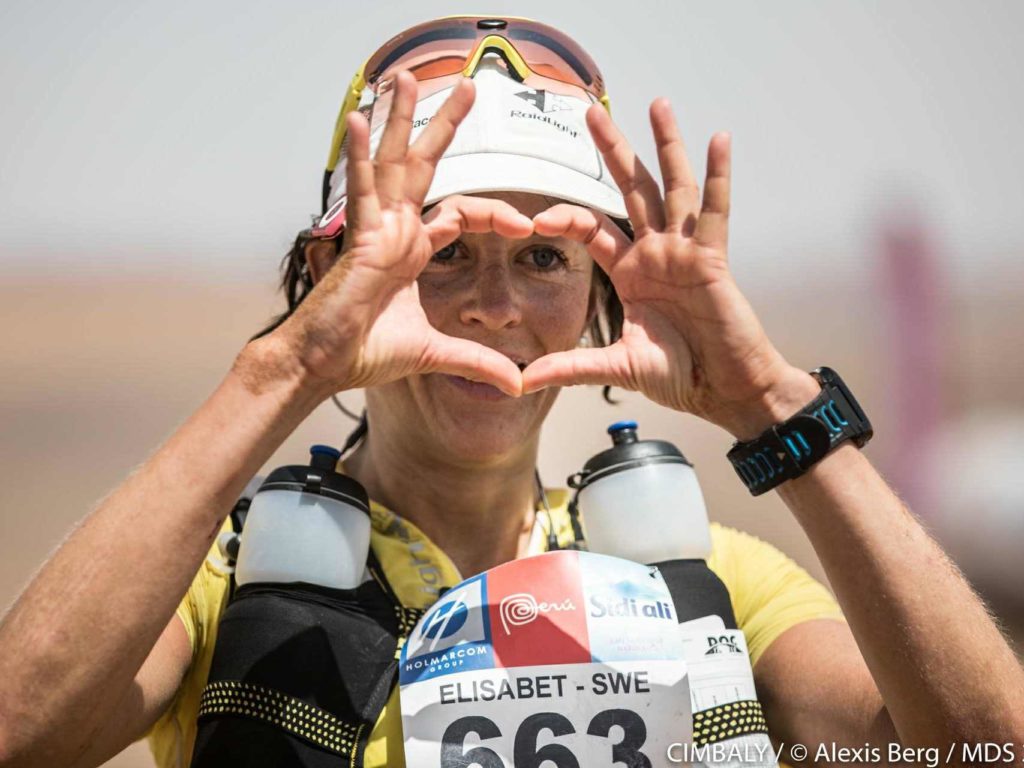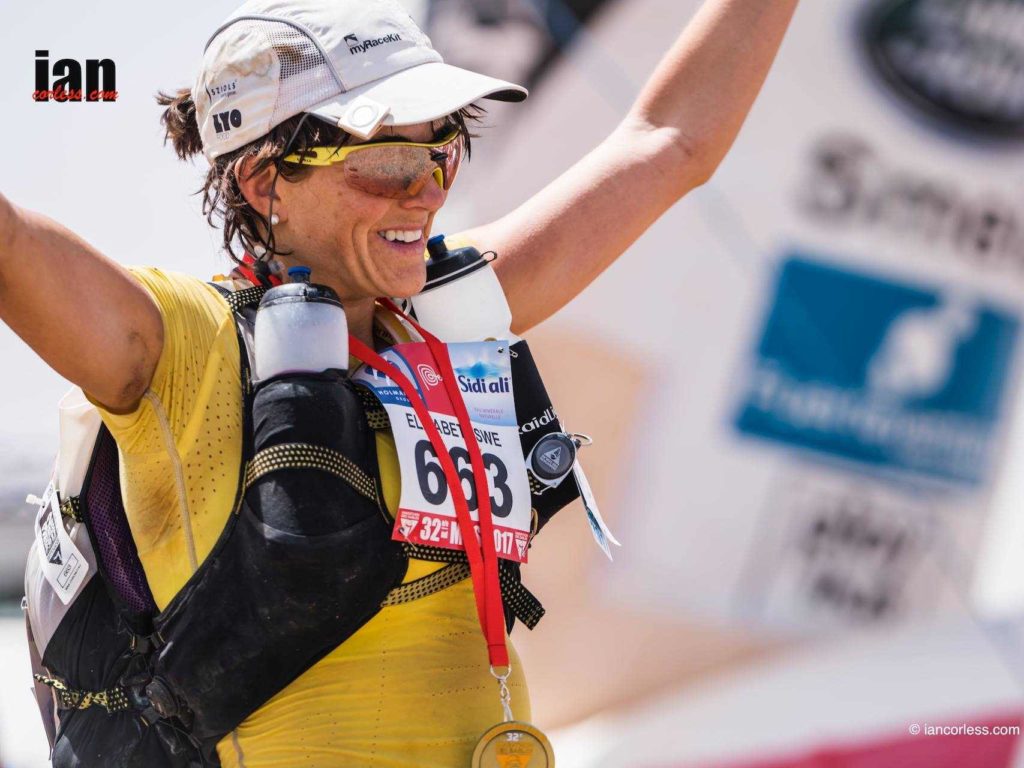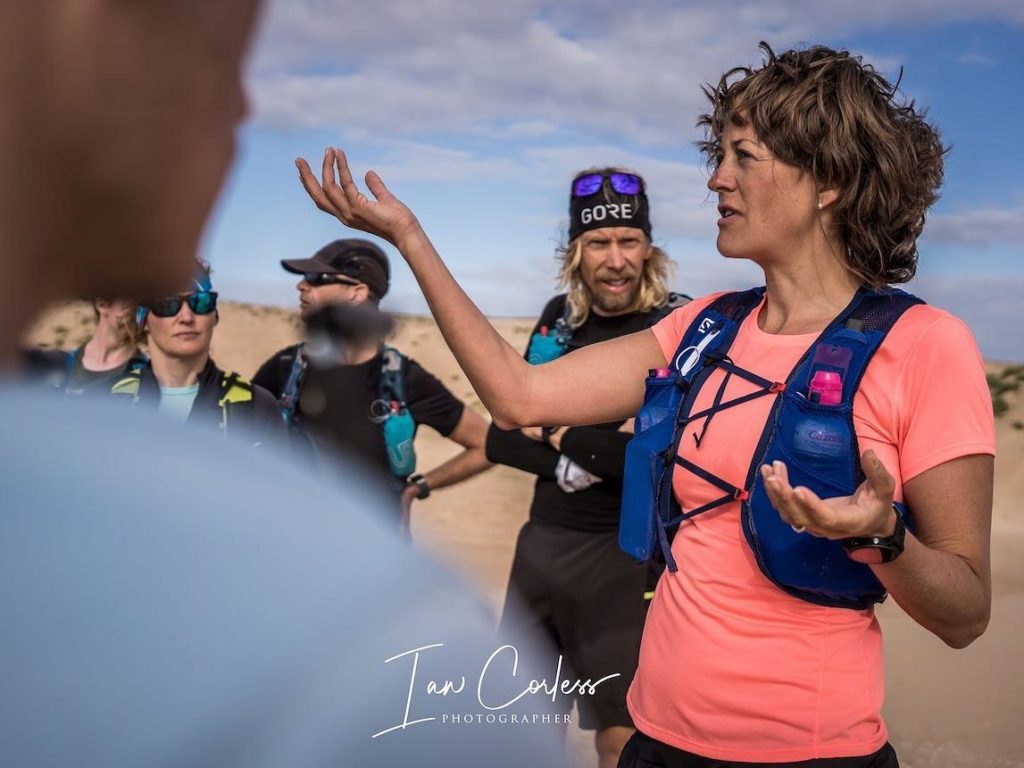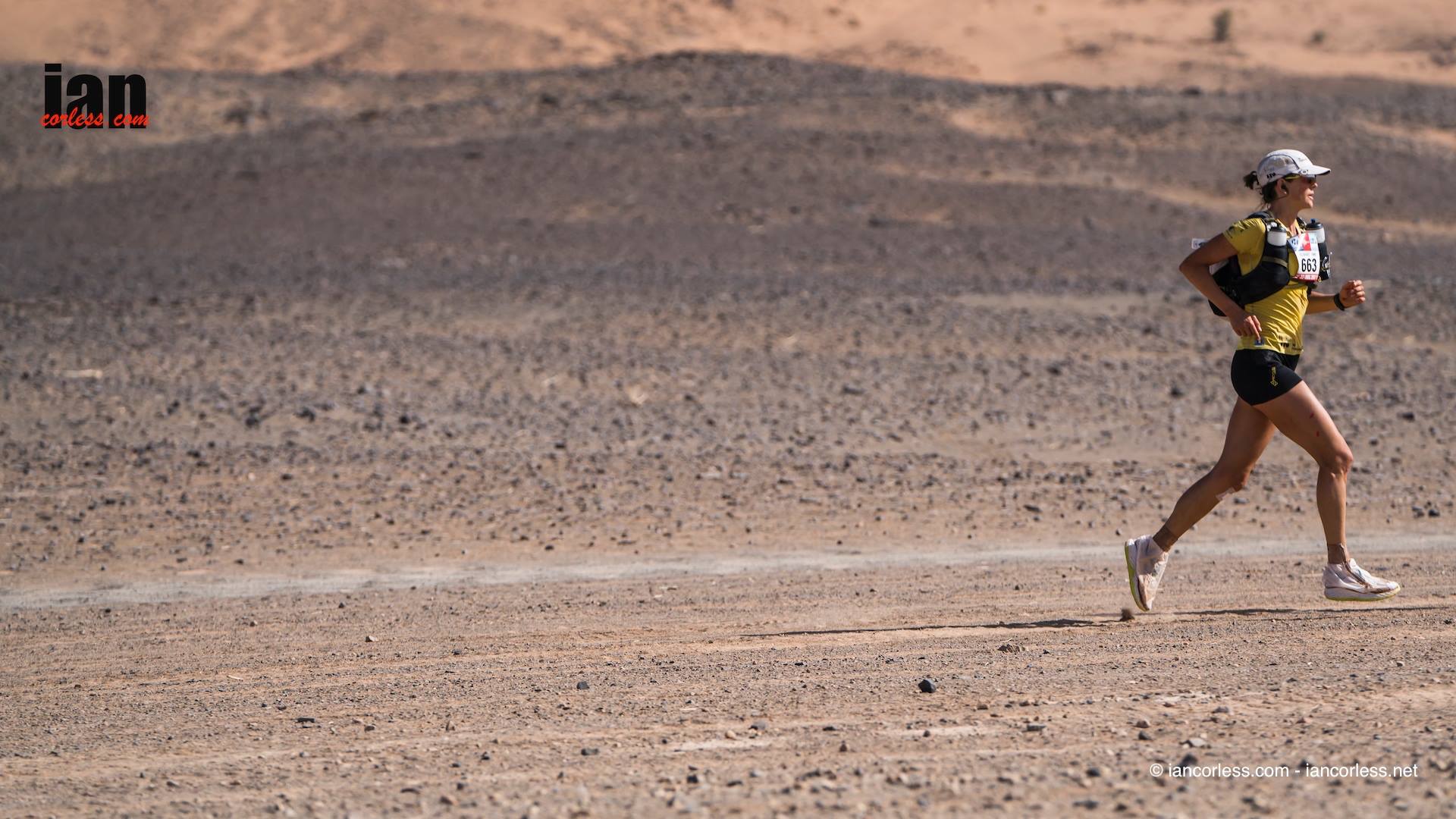Sex and ultrarunning are two issues seldom discussed in the same breath, but Swedish ultrarunner and two-time Marathon des Sables champion Elisabet Barnes has decided to tweak the conversation.
Elisabet Barnes’ Tuesdays look slightly different than before. On this particular Tuesday in June, the 43-year-old Swedish ultrarunning elite and extreme-event coach sits in front of her webcam in her home in Norway, her brown hair brushed back and the red curtains drawn. After sifting through her trove of trinkets earlier contemplating which she would highlight to her followers today, she’s decided the time has finally come for the glass dildos.
“What’s interesting about this is that I just threw this in people’s faces,” Barnes says with an equally cheeky and reticent grin the following day. “They were like, ‘Oh my God, she used to post about running. That’s a dildo.’”
It’s the seventh week of Elisabet Barnes’ Toy Tuesday, a segment in which the 2015 and 2017 Marathon des Sables female champion showcases different sex toys. In four minutes, Barnes explains everything from texture to usage of the seven-and-a-half-inch Fifty Shades of Grey glass wand. A week ago, she explained the ins and outs of a violet rabbit vibrator. The week before saw pleasure balls featuring Barnes in a glamourous red fur coat, her hair curled to perfection.
I think a lot of [women] are afraid to be feminine. They don’t want to get that attention. You know, I did this not because I’m a woman but because I’m just as good as everyone else.”
Elisabet Barnes
Most in the running world know Barnes as the two-time champion of the women’s 2015 and 2017 Marathon des Sables – the seven-day, 250-km trek through the Moroccon desert considered the ninth toughest race in the world. Or perhaps for winning the six-stage, 160-mile Big Red Run in Australia the year in between her des Sables victories, beating the nearest competitor, male or female, by an hour. Since entering the ultratrails in 2011, Barnes has become one of many women mounting the narrative of female ultrarunning’s successes. Women and men flock to her social media pages for advice, coaching, inspiration, dinner recipes. Now, she’s the woman holding the dildo and blogging about candualism and contraception apps.
“I lost a lot of followers. I remember my first sexy photo and,” Barnes points downwards and laughs, “1500 followers gone. Boom, like that.” She laughs again, an easy but unapologetic chime. “It’s polarising. When I post only about running, food, mundane things, it’s easy to be engaged with what I’m doing. It’s completely non-threatening. When I’m authentic, they leave.”
It’s no femme fatale gimmick. Barnes is on a mission to become the sex-positive voice in a sport that she says so often shies away from it. As a coach, woman, runner and now student sexologist and relationship therapist, Barnes aims to unmute the rhetoric surrounding sex to help people own their bodies and health without shame or judgment.
“I believe that everyone has the right to freely express their sexuality,” Barnes says. “Society is stuck in this wrong frame of mind about what it means to be a sexy woman, what she can say and show about her body. It’s something that is influenced not so much by men, but I think women. I think a lot of [women] are afraid to be feminine. They don’t want to get that attention. You know, I did this not because I’m a woman but because I’m just as good as everyone else.
“And in that mindset, we forget that we are women. Nothing is going to change that, and it shouldn’t.”

Sex and Running: A (Perceived) Dichotomy
“Let’s talk about sex” is not often uttered at a race’s start line. Sexy and ultrarunning aren’t particularly synonymous. Ultrarunners get sweaty, dirty and bruised. They hallucinate and vomit, portaloos act as viable second homes. Crossing the MDS finish line, Barnes was covered in days-old sand, grime and whatever else had found its way onto her body.
“You exhaust yourself. It’s really not something you think of looking pretty,” Barnes says.
I feel like if I suppress my femininity then I feel less good about myself, less sexy. For me, it’s a confidence thing.”
Elisabet Barnes
Sex isn’t intrinsically taboo. As Barnes notes, runners or not, sex happens. But the last five years of coaching and racing have shown Barnes that running and conversations about sex or sexuality share a less-than-friendly alchemy: not necessarily opposing but the two stay, for all intents and purposes, separated.
Before Barnes entered the running world, the two weren’t. When working as an engineering and business management consultant in London for almost a decade, she preferred life in multiple dimensions: engineering equations and silky sheets; hot pink dresses and mid-afternoon conferences. She found embracing both sides of the coin — being a sexy woman and being a successful woman — didn’t require separation.
“I think if I suppress my femininity then I feel less good about myself, less sexy. For me, it’s a confidence thing.”

Entering the running world — and more notably, conquering it –, things changed. Suddenly, Barnes stopped embracing her cleavage and curves. She covered them up. She needed to be a palatable competitor, one meant to race and to win. Being sexy or feminine was trivial.
“I didn’t want to lose it, but it’s gone in periods of time where I focused on it less.”
Good girls don’t talk about sex, don’t have too much sex, don’t be too sexy. Good girls have sex in moderation.”
Elisabet Barnes
Barnes warns that when women stop embracing sexuality on social platforms, the part of themselves that exists outside the sport disappears, and self-worth can crumble. The muted rhetoric impacts men as well: Divorces amongst male and female ultrarunners, not unlike Barnes’ own, proliferate when training demands and race expenses exacerbate relationships’ unspoken fissures, she says. Common sex problems brushed under the rug suddenly become the running equivalent to pulling a pin out of a hand grenade: sessions drag on, race results suffer, confidence falls limp and relationships disintegrate. Ultrarunning doesn’t happen in a vacuum, Barnes says, but often runners pretend it does.
“I think a lot of people don’t talk about their relationships, the problems, the sex. They stop having sex except twice a year, they do that for five years and then it’s like, oh what happened?” she says.
“I want to help people, but I can’t just throw people a training plan, it doesn’t work like that. They have to be able to do balance. If you’re unhappy in your relationship, then your training will suffer…so I’m forcing people to start thinking about things. They want to know about running, but surely it doesn’t matter if you’re a runner or not. You have sex.”

A Debilitating Impact on Body Image
Barnes also argues the persisting dichotomy poses a risk to physiological health and performance. When sex is seen strictly as an unspoken taboo, focus on healthy bodies becomes fuzzy. Unhealthy bodies, she says, can’t be sexy.
“You can’t, for a number of reasons. One of which is that your hormones would be completely out the whack, you won’t feel good about yourself,” she says. “Being more vocal about sex and being sexual can help people not fall into dangerous traps.”
It’s a trap Barnes found herself in. She points to an elementary truth: the less one weighs, the faster one runs. As her own name became synonymous with success, Barnes’ body became the means of attaining it. The eating disorder she carried from her youth manifested full throttle. She needed to be thin to win – and she was.
Just because a woman is pictured in some beautiful, sexy position with lingerie, nude, whatever, that doesn’t mean that I look at that as only sexy or what [someone] desires. It’s because she wants to do it, she feels good about herself, she has complete control.”
Elisabet Barnes
Surrendering health for trophies is not rare. According to a 2016 study by the British Journal of Sports Medicine, the prevalence of disordered eating ranks 20 percent higher for athletes compared to non-athletes. Ultra-endurance sports demand immeasurable wear and tear on the body. When the desire for immediate success usurps long-term health, the consequences result in relative energy deficiency (RED-s). Amongst women, it can lead to menstruation dysfunction or cessation (amenorrhea) and low bone density, known as the female triad.

According to Dr. Tracy Beth Hoeg, MD, Ph.D., an endurance sports physician-scientist, elite trail runner and assistant research professor at UC Davies, speed can be a blinding enterprise for young runners. Loss of menstruation becomes an afterthought or a perceived bonus. Women need only be in that state for a few days, she says, before hormone aberrations spike and long-term consequences carry pernicious undercurrents.
“The female body can compensate temporarily for not cycling normally, but the lower sex hormones drop, the higher cortisol and stress hormones get. Recovery takes longer and overtraining injuries, as well as stress fractures, can occur,” she says.
In her research on female ultrarunning physiology two years ago, Dr. Hoeg notes that amenorrhoea can feel like a temporary reprieve from monthly burdens, but normal cycles offer women athletes leverage, from increased aerobic endurance to ensuring successful muscle repair and regenerative processes occur.
Losing menstruation, Dr. Hoeg says, not only loses those performance benefits but bears a number of health risks, such as increased risk of injury, osteoporosis and infertility. Her UC Davis research team most recently found a correlation between bone mineral density and sex hormone levels (oestradiol and testosterone) in ultramarathon runners, both of which drop as bone mineral density lowers due to increased training and lacking fuel.
Yet, Dr. Hoeg says the question becomes about embracing a healthy, functioning body rather than sexuality.
“I don’t think it occurs because women don’t embrace their sexuality. I think loss of sexual drive or sense of sexuality for both sexes occurs as an after effect of the unhealthy physiological changes from insufficient fuelling in the face of hard training.”
Tossing the Taboo
However, stifling her sexuality helped Barnes in sacrificing her health and those aspects of herself that made her female, she says. She ignored the voice in her head that would otherwise argue for change. The cycle turned vicious until winning and maintaining a good body image became incompatible. Coming to terms with that reality can feel suffocating., she says. One of ultra-endurance sports most addictive qualities is its ability to push boundary after boundary until none exists. One of its most difficult, however, might be drawing boundaries ourselves.
If you want to stand up for something, then you have to accept that the more controversial it gets, the more people are going to turn away from you. Some people won’t like it, some people are going to think you’re really weird. Some people are going to hate it…”
Elisabet Barnes
“That’s what we’re up against,” Barnes says. “How do you feel good about your body, comfortable and confident in yourself, but at the same time feel, well, I’m not as skinny, as fast or as successful as I can be. If I just train a little bit more [because] there’s always someone willing to sacrifice for their short-term goal –”
At this moment, Barnes’ new partner, Norwegian professional mountain runner and coach Sondre Amdahl, waltzes into the room and plants a kiss on Barnes’ forehead. Barnes cheeks blush as he leaves.
“It’s taken me a long time to have the voice, and I think my husband has been very good and influenced that,” she says as he disappears. “We talk a lot about sex, we talk about it every day, different ways. We have this openness. He thinks it’s okay that I talk about it openly, most people wouldn’t think that.”

Finding authenticity in her sex life beyond the physical taboo allowed her to embrace her body over finish lines. Feeling sexy became a choice of health and self-confidence. Finding the courage to share that in a world so infatuated with “likes” took time, but Barnes says keeping the dimensions separated warrants a more destructive rhetoric.
“Good girls don’t talk about sex, don’t have too much sex, don’t dare be too sexy. Good girls have sex in moderation,” she says. “Just because a woman is pictured in some beautiful, sexy position with lingerie, nude, whatever, that doesn’t mean that I look at that as only sexy or what [someone] desires. It’s because she wants to do it, she feels good about herself, she has complete control.”
Not everyone agrees with her chosen tactics. Cesspools of negative comments have sprouted. Toy Tuesday has turned Barnes’ follower box into what feels like a constantly plunging timer. Her demographic is 65% male. Unsolicited dick-pics can barrage her inbox. However, many have found Barnes to be an authentic voice on a subject many feel ashamed to speak about. As new faces arrive, some old friends return, piqued at her bravery and the unfiltered lessons offered.

“This week, a woman sent me a message saying I want to apologise because I unfollowed you. I couldn’t really handle what you were doing. I felt awkward about it. But actually, I think it’s very good what you’re doing. You’re brave. What you’re doing, the rest of us are too scared to do and it’s inspiring and I’m back.”
Barnes laughs humbly.
“You can’t please everyone. I think that’s the thing,” she says. “If you want to stand up for something, then you have to accept that the more controversial it gets, the more people are going to turn away from you. Some people won’t like it, some people are going to think you’re really weird. Some people are going to hate it… The most rewarding thing has been that I know that I genuinely help people.”
